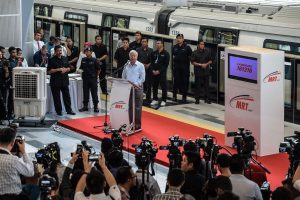What price Malaysia’s trust deficit?

Malaysians, it seems, are less willing to go along with government policies no matter how attractive the long-term benefits are.
Abdillah Noh, The Straits Times
The last weeks of December have been busy ones for Malaysian Prime Minister Najib Razak. On Dec 13, Datuk Seri Najib signed the much awaited High Speed Rail (HSR) agreement with Prime Minister Lee Hsien Loong that will link Kuala Lumpur and Singapore.
That same week, he officiated at the opening of Malaysia’s Mass Rapid Transit (MRT), a project that started in 2011. Days later, on Dec 18, Mr Najib launched the 1.4km-long Batang Sadong Bridge in Sarawak, a huge connectivity leap for Sarawakians, who previously had to rely on ferry crossings. The bridge is one of several projects the government has in store for Sarawak, the others being the massive 2,000km-long Pan Borneo Highway that will link Sarawak and Sabah and a coastal highway that will connect towns in Sarawak.
Soon after the Sarawak trip, Mr Najib was in Sabah to launch eight projects linked to the Pan Borneo Highway. The recent launches came weeks after Mr Najib’s trip to China, one that saw the Malaysian economy potentially receiving a thumping US$33 billion (S$48 billion) of Chinese investment. A major part of the investment deal was Malaysia agreeing to build a 640km-long East Coast Rail Line(ECRL) with Chinese financing. Once completed, the ECRL will link the northernmost town in the east coast state of Kelantan to Port Klang, which fronts the busy Straits of Malacca on the west coast. Needless to say, these infrastructural investments are major game changers that are set to alter Malaysia’s landscape in a fundamental way, unleashing the country’s huge economic potential.

